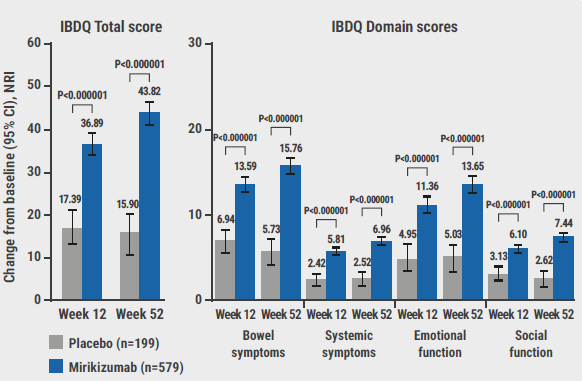SHP647 - an IgG2κ anti-MAdCAM human monoclonal antibody – is in development for induction and maintenance of remission in patients with CD and UC. OPERA II, a 72-week, multicentre, open-label, phase-2 extension study, successfully added evidence for the long-term safety and efficacy of SHP647 in patients with moderate-to-severe CD.
D’Haens et al. included 268 patients from OPERA I and the open-label study TOSCA. Patients had completed 12 weeks of treatment (placebo or 22.5, 75, or 225 mg SHP647, SC) in OPERA I, or had a clinical response (≥3-point decrease in Harvey-Bradshaw Index (HBI) score) on 225 mg SHP647 in TOSCA. Patients received SHP647 (75 mg, SC) every four weeks from baseline to week 72, and were followed up monthly for six months. Dose de-escalation to 22.5 mg, owing to intolerance/AEs, or escalation to 225 mg, owing to clinical deterioration/poor response, were subject to investigator evaluation.
Primary endpoints were frequency of AEs, AEs leading to withdrawal, and serious AEs [13]. Mean age of the study population was 36.5 years, 56.3% were female, and 149 patients completed the study. Mean HBI score at OPERA II baseline was 4.9. The number of AEs recorded during the treatment and follow-up periods was 1,150 and 461, respectively. The most common TEAEs during treatment were nasopharyngitis (5.6%), arthralgia (6.0%), and headache (5.2%).
No patient experienced progressive multifocal leukoencephalopathy. A total of 80 patients experienced serious AEs and these were considered treatment-related in ten patients. A total of 54 patients had AEs leading to discontinuation; the most common AEs were CD flares.
There were two deaths in the study. One patient (75 mg) died of multiple organ failure after post-operative aspiration following a resection of the terminal ileum. Another patient (225 mg) died of metastatic neoplasm of unknown primary (adenocarcinoma was identified on cytology). Neither death was considered drug-related. HBI remission and response rates showed no unexpected decay over time.
These results lead to the conclusion that SHP647 was well-tolerated by the study population. The sustained HBI response rate suggests efficacy of SHP647 over the 72 weeks of treatment [14].
- Sandborn WJ, et al. Gut. 2017 [Epub ahead of print]
- D‘Haens GR, et al. OP024. ECCO 2018.
Posted on
Previous Article
« Significantly increased risk of CRC and/or HGD after appendectomy in UC Next Article
Targeting early disease: lessons from rheumatoid arthritis »
« Significantly increased risk of CRC and/or HGD after appendectomy in UC Next Article
Targeting early disease: lessons from rheumatoid arthritis »
Table of Contents: ECCO 2018
Featured articles
IBD diagnostics
IBD disease patterns and genetics
Novel treatment strategies
Efficacy and safety of biologics
Oncology in IBD
Surgery for IBD
Related Articles

August 9, 2019
Haematopoietic stem cells can sense tissue damage in the gut
September 29, 2021
Live varicella-zoster vaccine safe, effective with TNF inhibitors

© 2024 Medicom Medical Publishers. All rights reserved. Terms and Conditions | Privacy Policy
HEAD OFFICE
Laarderhoogtweg 25
1101 EB Amsterdam
The Netherlands
T: +31 85 4012 560
E: publishers@medicom-publishers.com

